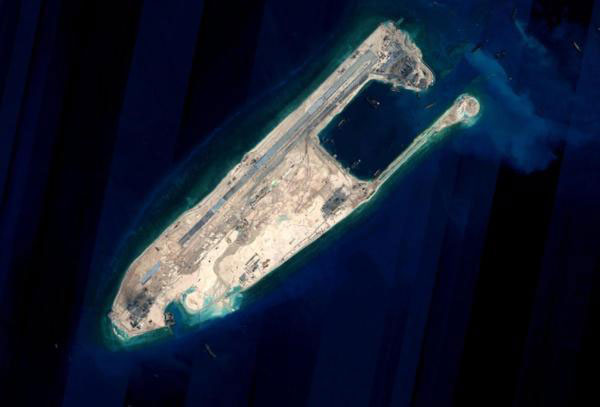
This satellite image shows the Yongshu Jiao of China's Nansha Islands. (Photo/Xinhua)
The Philippines has initiated arbitration proceedings on the South China Sea through the United Nations Permanent Court of Arbitration. Its No.1 and No.2 arbitration requests are to let the court rule that China's historical rights in the "nine-dash line" area of the South China Sea are against the UN Convention on the Law of the Sea, which was concluded in 1982, so as to deny the legality of China's interests.
To realize this purpose, the Philippines has intentionally distorted the facts, made guesses about China's historical interests and interpreted UNCLOS to suit itself.
Manila pretends to be blind to the basic historical facts, claiming that historically Chinese people had no activities in the South China Sea, and China lacks historical connections with the sea.
But history is history. Chinese people have engaged in maritime activities in the South China Sea for more than 2,000 years. They discovered, named and developed the reefs and islets first. The Chinese government of every dynasty has exercised jurisdiction over these islands and their waters by setting up administrative regions, military navigation and marine salvage.
Japan invaded China's Xisha Islands and Nansha Islands during its war of aggression. The Cairo Declaration in 1943 and the Potsdam Proclamation in 1945 clearly stipulated that Japan must return the Chinese territory it occupied in China. Accordingly, the Chinese government sent military and administrative officials to take back the Xisha Islands and the Nansha Islands, and garrisoned the islands. China resumed the exercise of its sovereignty over the reefs and islet and their surrounding waters.
Manila denies China's historical rights over the reefs and islets in the South China Sea and the waters within the "nine-dash line", alleging that China did not claim its historical rights in the South China Sea until 2009, 17 years after UNCLOS came into force.
This is a malicious interpretation of China's historical rights over the South China Sea. The Chinese government has repeatedly stressed China gradually acquired its sovereignty and relevant rights over the reefs and islets in the South China Sea and their adjacent waters over centuries. And the Chinese governments of different times have always adhered to this stance.
The Chinese government renamed the islands and reefs in the South China Sea after geographic measurement in 1947, and drew the nine-dash line on its official national map in 1948, reiterating and confirming its sovereignty and relevant rights over this area of the South China Sea.
The Chinese government has adhered to, and taken concrete actions to maintain China's historical rights in the South China Sea since Oct 1, 1949.
To dismember China's historical rights, Manila claims, groundlessly, China's rights in the "nine-dash line" are not legally binding, according to UNCLOS. However, the drafters of the Convention and countries signatory to it have given full consideration to the complexity of countries' historical rights acquired via customary international laws through long-term practices, and thus UNCLOS does not rule on various kinds of historical rights, which are not changed by the Convention, and continue to be decided by the customary international laws.
Therefore, UNCLOS does not have binding legal stipulations to judge China's historical rights in the South China Sea, and the arbitration court does not have right to make a ruling beyond the power of UNCLOS on China's historical rights.
The Philippines has included tendentious points of view by some scholars in its arbitration filing that fabricate the Chinese government's stance and facts about China's historical rights.
The views of these academics are by no means objective and factual evidence. Using personal views is not a valid way to prove a government's stance is legal. No serious, just and professional international judicial procedures accept scholars' personal theses as factual evidence.
Meanwhile, China has large amounts of historical materials and state files proving the opposite of the Philippines' claims. Manila's contrived "evidence" is support of its claims only makes the arbitration farce more absurd, and harms the UNCLOS' authority in ruling that disputes should be solved in a peaceful manner.
China's historical rights in the South China Sea are not influenced by the Philippines' distorting of the facts, or the arbitration proceedings based on Manila's abusing of the UN convention. China's historical rights over the South China Sea will continue to apply in accordance with customary international laws, and are respected by UNCLOS.
The author is an international issue observer in Beijing.


















































